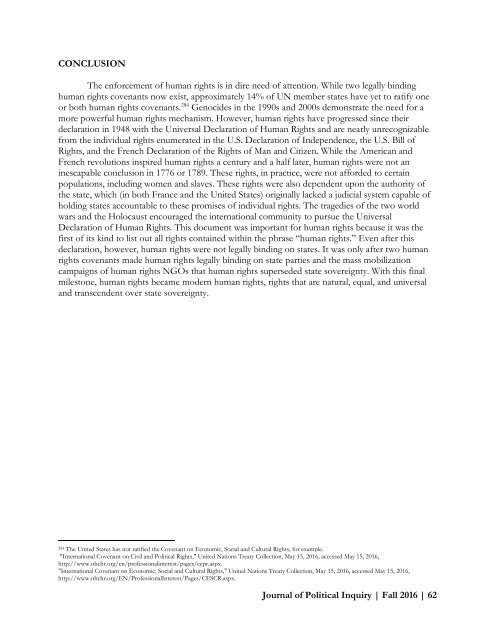Fall2016_Final
You also want an ePaper? Increase the reach of your titles
YUMPU automatically turns print PDFs into web optimized ePapers that Google loves.
CONCLUSION<br />
The enforcement of human rights is in dire need of attention. While two legally binding<br />
human rights covenants now exist, approximately 14% of UN member states have yet to ratify one<br />
or both human rights covenants. 284 Genocides in the 1990s and 2000s demonstrate the need for a<br />
more powerful human rights mechanism. However, human rights have progressed since their<br />
declaration in 1948 with the Universal Declaration of Human Rights and are nearly unrecognizable<br />
from the individual rights enumerated in the U.S. Declaration of Independence, the U.S. Bill of<br />
Rights, and the French Declaration of the Rights of Man and Citizen. While the American and<br />
French revolutions inspired human rights a century and a half later, human rights were not an<br />
inescapable conclusion in 1776 or 1789. These rights, in practice, were not afforded to certain<br />
populations, including women and slaves. These rights were also dependent upon the authority of<br />
the state, which (in both France and the United States) originally lacked a judicial system capable of<br />
holding states accountable to these promises of individual rights. The tragedies of the two world<br />
wars and the Holocaust encouraged the international community to pursue the Universal<br />
Declaration of Human Rights. This document was important for human rights because it was the<br />
first of its kind to list out all rights contained within the phrase “human rights.” Even after this<br />
declaration, however, human rights were not legally binding on states. It was only after two human<br />
rights covenants made human rights legally binding on state parties and the mass mobilization<br />
campaigns of human rights NGOs that human rights superseded state sovereignty. With this final<br />
milestone, human rights became modern human rights, rights that are natural, equal, and universal<br />
and transcendent over state sovereignty.<br />
284<br />
The United States has not ratified the Covenant on Economic, Social and Cultural Rights, for example.<br />
"International Covenant on Civil and Political Rights," United Nations Treaty Collection, May 15, 2016, accessed May 15, 2016,<br />
http://www.ohchr.org/en/professionalinterest/pages/ccpr.aspx.<br />
"International Covenant on Economic, Social and Cultural Rights," United Nations Treaty Collection, May 15, 2016, accessed May 15, 2016,<br />
http://www.ohchr.org/EN/ProfessionalInterest/Pages/CESCR.aspx.<br />
Journal of Political Inquiry | Fall 2016 | 62
















